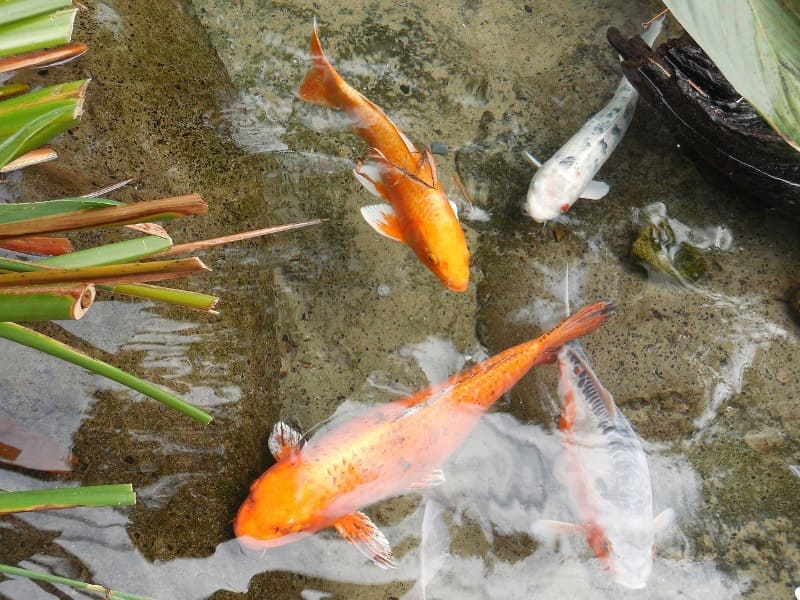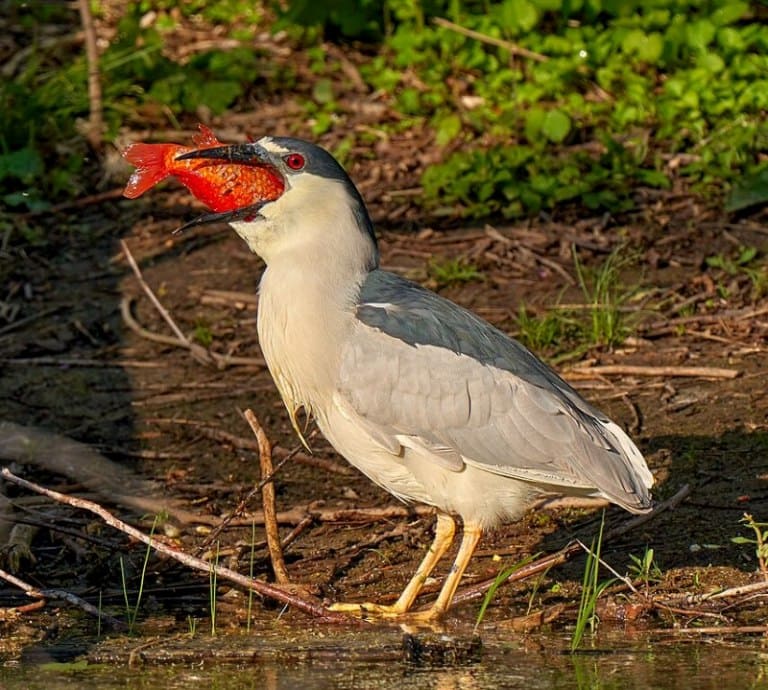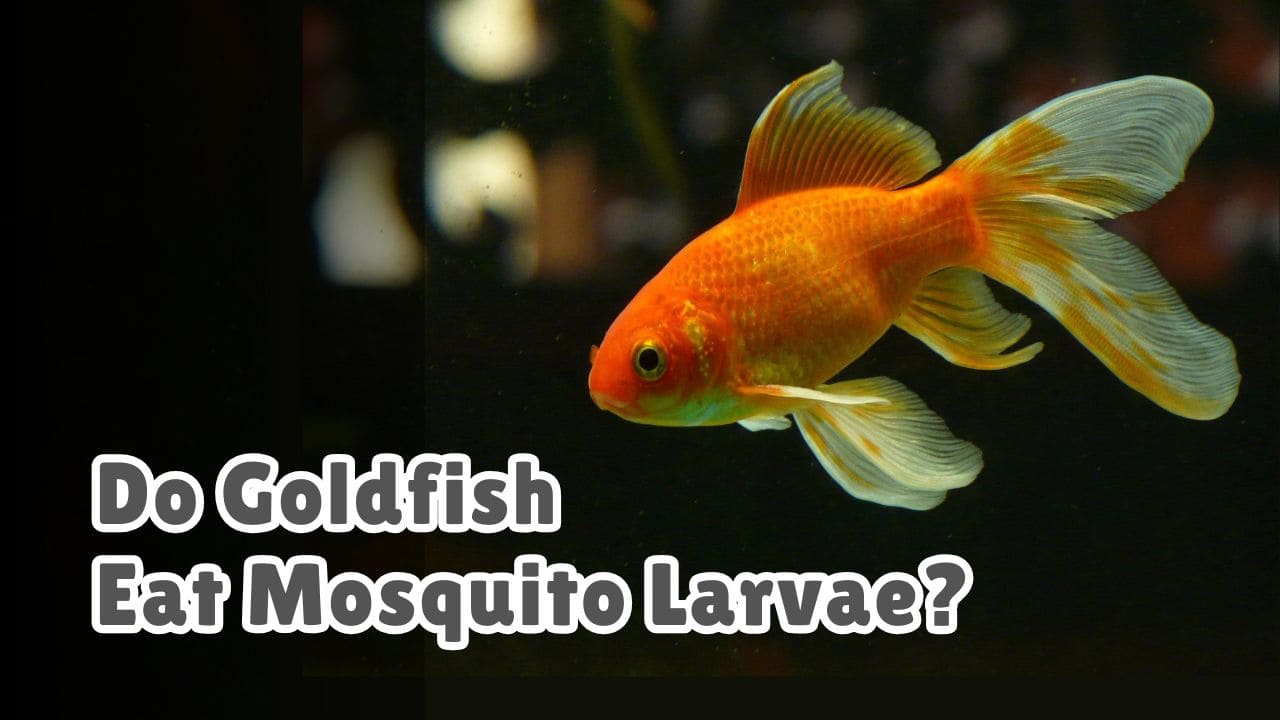Table of Contents
Fish, especially goldfish, have proven to be the most successful in dealing with adult mosquitoes. Probably some of us are amused at the fact that goldfish eat mosquito larvae but goldfish surely do. Most pet owners like keeping a couple of goldfish in their tanks, ponds and water features to enhance their decorative pieces.
The said article will therefore address only the goldfish used in the test for water bodies in as far as controlling mosquitoes is concerned. We will consider the advantages or disadvantages of directing such courses of action that would involve goldfish introduction for the purpose of mosquito control.
Do goldfish eat mosquito larvae in water?
Goldfish are omnivores which encompass a varied diet that also consists of mosquito larvae. The younger species of goldfish targets mosquito larvae quite strategically feeding in water bodies where there is a possibility of mosquito breeding such as ponds, water features, aquariums and etc.
Goldfish are known to be surface feeders that easily consume mosquito larvae positioned close to the water surface to obtain air. As a result, goldfish become a valuable predator in biological control of mosquitoes.
Do comet goldfish eat mosquito larvae?
Comet goldfish or comet-tailed goldfish are similar in appearance to the ordinary goldfish and likewise consume mosquito larvae. These fish are able to adapt to outdoor environments such as ponds and water gardens and are helpful to get rid of the pesky mosquitos. The benefits are somewhat alike to those of the goldfish and similarly the same considerations and rules are to be respected in these cases as well.
Aquarium fish that eat mosquito larvae
In addition to goldfish and comet goldfish, there are other aquarium fish varieties that eat mosquito larvae. These includes guppies, gambusia, betta fish, killifish and some species of cichlids. They are very effective in eating mosquito larvae because of their smaller size and surface-dwelling behavior.
However, their effectiveness depends on many other factors and they all gives a varied level of effectiveness against mosquito population control. We should keep the aquarium environment clean and balanced to keep the fish healthy and effective.

Image Credit: Google images | Creative Commons License
Benefits of using goldfish for mosquito control
Goldfish eat mosquito larvae and helps us controlling the mosquito populations before they emerge as adult mosquitoes and may spread diseases later on. Using goldfish is more beneficial to control mosquito infestation because of following factors:
- Natural and Eco-friendly way of mosquito population control: It is a chemical free and natural method of mosquito control. Goldfish poses no harm or safety risk to the environment and individuals and even pets, as compared to chemical based insecticides. It is a preferred choice among environment conscious homeowners and garden pond owners.
- Continuous control for as long as we need: Goldfish are put into a mosquito dominated water body, where they tend to consume mosquito larvae routinely. In this way, goldfish gulp down the larvae prior to the time they grow into adult mosquitoes.
- Safe for other beneficial insects and aquatic life: They do not affect the ecosystem negatively by disturbing other insect species that are beneficial like mayfly larvae. They are also harmless to other wildlife species such as toads, frogs, ducks and geese etc.
- Low maintenance: The goldfish can survive easily in clean and maintained pond or water feature. You just need to keep the water clean and it also require some other food source as a variety to keep them healthy and fit.
- Adds beauty and aesthetic value: With beautiful and vibrant colors and graceful movements, goldfish add aesthetic beauty and charm to your aquarium, pond, or any outdoor water feature. Thus, it enhances the look and appeal of your pond, aquarium along with serving a purpose of reducing mosquito population.
How to use goldfish for mosquito control?
The environment for goldfish should be clean and well-maintained to make them thrive and get the benefits with maximum effectiveness. For using goldfish for mosquito control, the following actions should be taken to maximize their effectiveness:
- Calm and still water: Goldfish can easily eat mosquito larvae where there is no water movements. The water should be calm and still so that they can come to the surface and easily feed on larvae.
- Enough depth and space: The water body should have enough depth and space for goldfish to swim and grow, especially when your dealing with Indoor aquariums. the depth of at least 3 feet and enough space with no restriction due to crowd of other fish and aquatic plants in your ornamental pond will keep your goldfish happy.
- Maintain clean water: Goldfish needs clean water that is well oxygenated, to thrive. Water should be clear and free of debris, impurities and wastes. Using water filter and aerator pumps will help to keep the water clean and oxygenated.
- Provide shade and cover: Goldfish needs some shade and cover to protect themselves from direct sunlight or extreme temperatures. Many aquatic plants like water lilies and water lettuces can provide such needed shade and cover, and can be easily grown in your pond and water features.
- Maintain adequate temperature levels: The goldfish need adequate levels of temperature around 72 to 78 oF (22 to 22.5 oC). Fancy goldfish and some other species of goldfish may develop health problems when added to outdoor ponds specially during winters. In such a case, you may need to heat the pond which is not feasible in most of the cases. The adequate temperature range helps to boost their immune system as well as metabolism that allows easier digestion.
- Avoid over feeding: Goldfish eats mosquito larvae along with algae and other microbes present in the water body. You should add some fish food to feed them but this should be in controlled quantity as they tend to act hungry all the time, otherwise it will lead to over-feeding.
- Age, size and number of goldfish: Goldfish eats mosquito larvae depending on their age and size. About a week old goldfish, eats larvae that are just hatched and not any large larvae that has grown into huge wrigglers. Large wrigglers are too big to be consumed by these young goldfish. While on the other hand, large matured goldfish may not feed on mosquito larvae and needs other sources like algae and fish food.
So, sufficient number of goldfish is required to consume a good number of mosquito larvae per day which are just hatched. And if left to mature they will turn into adult mosquitoes and the purpose will not be served completely.
Factors to consider while using goldfish as mosquito larvae predator
The following factors should be considered when you are using goldfish as mosquito predator:
- Water temperature: Goldfish prefers a particular range of temperature that should be maintained for their health. Extreme hot and cold temperatures, especially in winters where ponds temperature may drop near freezing points, the goldfish may find hard to survive. While excessive heat or warmer temperature may develop stress in them. Therefore, adequate temperatures as per different goldfish species should be maintained.
- Predators: There are birds like herons, cranes, egrets, etc.; larger fish in the pond, animals like raccoons and pets like cats are some of the predators that hunt for goldfish. Provide hiding spots within your pond using rocks and aquatic plants or install netting cover over the pond to protect them from predators.
- Pond size: In case you are relatively new to pond conservation and are intending to stock multiple fish and aquatic plants in your pond then you ought to keep some additional volume for movements and swimming across the pond. Also, the specific size of the pond should be large enough to allow goldfish ample space for their growth and well being.
- Algae growth: Even though algae is eaten by goldfish, it should not be allowed to grow excessively. Any excess algae growth will spoil the water quality, transparency, and clarity making the water green and turbid. Goldfish cannot survive in such green turbid and dirty water.

Image Credit: Wikimedia by Quist | Content License
📰 Must Read,
✔️ 10 Best Hanging Plants that Keep Mosquitoes Away
✔️ How to Get Rid of Mosquito Eaters?
Conclusion: About goldfish eating mosquito larvae in water
Although goldfish eat mosquitoes, we need to check and maintained the conditions that will keep them healthy, happy and satisfied. As we know goldfish are like ornamental fish that enhances the appearance and aesthetics of your pond, aquarium, water features, etc. but these fish grow in size and only the younger goldfish are effective enough while eating mosquito larvae.
It is due to the fact that it is unwise to depend on goldfish alone, a number of fish varieties including gambusia, guppies, koi, minnow etc., are also to be included. In addition, during an outbreak of mosquito infestation, application of BTI (Bacillus Thuringiensis Israelensis) is also encouraged which are sold as mosquito dunks.
This is on the grounds that one should not solely rely on goldfish, it is prudent to include additional fish varieties including gambusia (mosquito fish), guppies, koi, minnow etc. Furthermore, in the event of an outbreak of mosquito infestation, application of BTI (Bacillus Thuringiensis Israelensis) is also suggested which are easily available as mosquito dunks.
Frequently Asked Questions (FAQs)
-
What is the best fish to eat mosquito larvae?
Due to their high capacity for predation on the larvae per day these fish have been termed the mosquito fish. Gambusia affinis is the greatest fish that feeds the best mosquitoes with mosquitoes.
-
Can I feed mosquitoes to fish?
I am afraid, there is no way that adult mosquitoes can be eaten by fish. Some fish types eat only the mosquito larvae, i.e wrigglers. You can give wrigglers to your fish but raising mosquitoes is not encouraged. Furthermore, it’s unlawful to rear mosquitoes in certain regions of the world for instance California.
-
Can I feed mosquito larvae to my goldfish?
Yes, it is possible to feed mosquito larvae to goldfish. However, it is the young gold fishes that feed on mosquito larvae and not the larger ones. Goldfishes should be fed properly with a varied diet of such small fish like algae, food fish, etc. in addition to mosquito larvae to make them healthy.
-
What fish eat the most mosquitoes?
Gambusia fish tend to consume quite a substantial amount of mosquito larvae daily. They are very well-known and extensively employed as biological control agents for the mosquitoes infected ponds and aquariums. A fully grown gambusia fish can eat 100 to 300 mosquito larvae in a day.
-
Do goldfish eat tadpoles?
Yes, goldfish eats tadpoles as they are very good hunters and opportunistic feeders. They will eat anything alive that can fit into their mouth. The tadpoles can protect themselves if they get some place to hide where these goldfish can’t access.
The spaces like between the rocks and small spaces between plants and leaves, and extensive plant growth can limit the goldfish preying on tadpoles. -
How to prevent mosquito larvae in fish tank?
To get rid of mosquito larvae in fish tank, simply add mosquito predator fish like gambusia, goldfish, guppies, betta fish, killifish, etc. But to prevent any further mosquito breeding you can add mosquito dunks or mosquito bits in your fish tank.
-
Do guppy fish eat mosquito larvae?
Yes, guppy fish inspite of their smaller tiny size, can eat large number of mosquito larvae up to their own weight. They can survive in variety of open water sources. They prefer to eat any organisms, that are small and moving.
-
Do fish tanks attract mosquitoes?
Yes, fish tanks are a condition that can be seen as conducive for the breeding of mosquitoes as they may encourage the breeding. Any still water in a fish tank which is an open aquarium with still water which does not have any water movement is likely to attract mosquitoes for egg laying. If the fish tank is disturbed and active inflow and outflow of water takes place, than mosquitoes will not lay eggs.
-
What kills mosquito larvae in aquarium?
Add gold fish and minnows or mosquito fish, or create water movements or ripples through aquarium pump, or use natural larvicides like BTI known as mosquito dunks.
-
Is mosquito larvae good for fish?
Yes, mosquito larvae are good source of protein and are beneficial for growth and health of fish. Feeding mosquito larvae to fish serves dual purpose of fish feeding and reducing the mosquito population.

